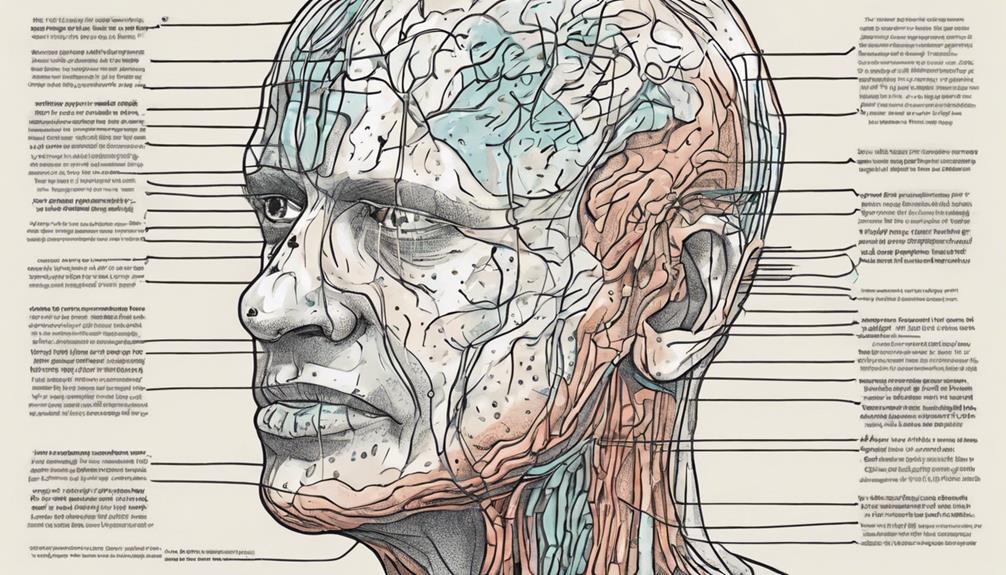Yes, tapping is a beneficial form of somatic therapy. By stimulating specific points on your body, tapping can release emotional distress and enhance your emotional well-being. It reduces cortisol levels, manages symptoms of PTSD, anxiety, and depression, all while strengthening the mind-body connection. Tapping combines Eastern and Western techniques, focusing on the Emotional Freedom Technique (EFT) to induce physiological changes. You can get started by practicing self-awareness and personalizing tapping sequences. Manage stress, anxiety, and depression through quick tapping sessions for stress relief. Try tapping to address anxiety triggers and improve your overall well-being.
Key Takeaways
- Tapping is a somatic therapy technique.
- Releases emotional distress and regulates the nervous system.
- Enhances emotional well-being and reduces cortisol levels.
- Manages symptoms of PTSD, anxiety, and depression.
- Strengthens the mind-body connection and improves stress management.
Tapping as Somatic Therapy

Tapping serves as a powerful somatic therapy technique that involves stimulating specific points on your body to release emotional distress. This method acknowledges the mind-body connection, recognizing that emotional well-being is intertwined with physical sensations.
By tapping on these points, you can regulate the nervous system, addressing stored trauma and negative emotions that may be impacting your mental health. This physical touch serves as a way to release tension that has been held in the body, allowing you to process and release emotional distress effectively.
For individuals struggling with anxiety, tapping can be particularly beneficial. Research indicates that this somatic therapy can help reduce symptoms of anxiety, PTSD, and depression. By incorporating tapping into your self-care routine, you may find relief from the overwhelming emotions that have been weighing you down.
Through this simple yet effective technique, you can take steps towards improving your emotional well-being and finding a sense of calm amidst the storm.
The Benefits of Tapping

Enhancing emotional well-being and stress management, tapping offers a gentle and effective method for releasing stored emotional trauma in the body. By targeting specific tapping points, this form of somatic therapy helps individuals reduce cortisol levels, indicating a decrease in stress and anxiety.
Research suggests that tapping is beneficial for managing symptoms of PTSD, anxiety, and depression by regulating the nervous system. The practice not only aids in releasing negative emotions but also fosters a stronger mind-body connection.
The advantages of tapping extend to improved emotional well-being, enhanced stress management, and a reduction in negative emotions. By addressing the root cause of emotional distress, tapping provides individuals with a holistic approach to healing.
Through the combination of physical touch and psychological acknowledgment, tapping serves as a powerful tool for promoting emotional resilience and overall mental wellness. Experience the benefits of tapping firsthand and set out on a journey towards greater emotional healing and stress relief.
Science Behind Tapping

By blending Eastern and Western approaches, the science behind tapping explores the intricate connection between the mind and body. EFT, or Emotional Freedom Technique, focuses on tapping specific points on the body to address emotional and mental stress. Through somatic stimulation, tapping aims to induce physiological changes that can help in reducing stress levels and promoting emotional well-being. Research indicates that tapping can lower cortisol levels, a hormone associated with stress, and decrease markers of stress in the body.
Tapping techniques acknowledge that trauma can be stored in the body, leading to emotional dysregulation. By incorporating elements of both traditional Eastern practices and modern Western psychology, tapping works with the body's energy system to release negative emotions and restore balance. EFT tapping has shown effectiveness in alleviating symptoms of conditions like PTSD, anxiety, and depression by targeting the mind-body connection and facilitating healing through somatic intervention.
Getting Started With Tapping

To begin incorporating tapping into your daily routine, consider starting with a simple self-awareness practice. Begin by identifying any emotions or stress you're experiencing.
Choose a specific tapping technique that resonates with you – perhaps focusing on self-acceptance or calming your nervous system. Tapping works by stimulating the body's meridian points, aiding in the release of negative emotions and stress. By tapping on these points while acknowledging your feelings, you can effectively regulate your emotions and energy flow.
Personalizing your tapping practice is key to its effectiveness as a somatic therapy. Tailor your tapping sequences to address your individual experiences and emotions. Combine the physical tapping with affirmations that promote self-acceptance and understanding.
This personalized approach will help you manage anxiety, stress, and trauma effectively. As you explore different techniques and find what works best for you, tapping can become a valuable tool in your daily self-care routine.
Practical Applications of Tapping

Explore how tapping can be effectively utilized in real-life situations to address various mental health challenges and emotional issues. Tapping, also known as Emotional Freedom Techniques (EFT), can aid in managing stress, anxiety, PTSD, and depression by targeting specific meridian points on the body. By incorporating tapping into your daily routine, you can experience relief from overwhelming emotions and improve your overall well-being.
To better understand the practical applications of tapping, consider the following scenarios:
| Scenario | Practical Application |
|---|---|
| Dealing with daily stress | Perform a quick tapping session to release tension and calm the mind. |
| Managing anxiety symptoms | Use tapping to address specific anxiety triggers and promote relaxation. |
| Coping with past trauma | Incorporate tapping into therapy sessions to work through PTSD symptoms. |
Frequently Asked Questions
Is Tapping Scientifically Proven?
Yes, tapping is scientifically proven. It regulates the nervous system, reduces stress hormones, manages anxiety, depression, PTSD, and phobias. Research shows tapping on meridian points releases stored trauma, improving heart rate, blood pressure, and cortisol levels.
What Are the Scientific Benefits of Tapping?
Explore the scientific benefits of tapping – regulating your central nervous system, reducing cortisol, and releasing stored emotional energy. This practice creates new neural pathways, enhancing emotional well-being, and activating brain areas for behavior change.
Does the Tapping Solution Really Work?
Does the tapping solution really work? Yes, it does! By tapping on meridian points, you release negative emotions and promote healing. Research supports its effectiveness in reducing anxiety, depression, and PTSD symptoms. Try it today!
Is Tapping a Somatic Practice?
Tapping is indeed a somatic practice. It involves physical techniques targeting specific body points to release stored emotions. Research indicates its effectiveness in reducing stress and trauma. Through tapping, you can experience somatic relief and emotional healing.
Conclusion
So, is tapping somatic therapy? Absolutely!
The benefits of tapping are supported by science and can be a powerful tool for addressing emotional and physical issues.
By incorporating tapping into your daily routine, you can experience the transformative effects of this practice firsthand.
Give it a try and see for yourself how tapping can improve your overall well-being.










